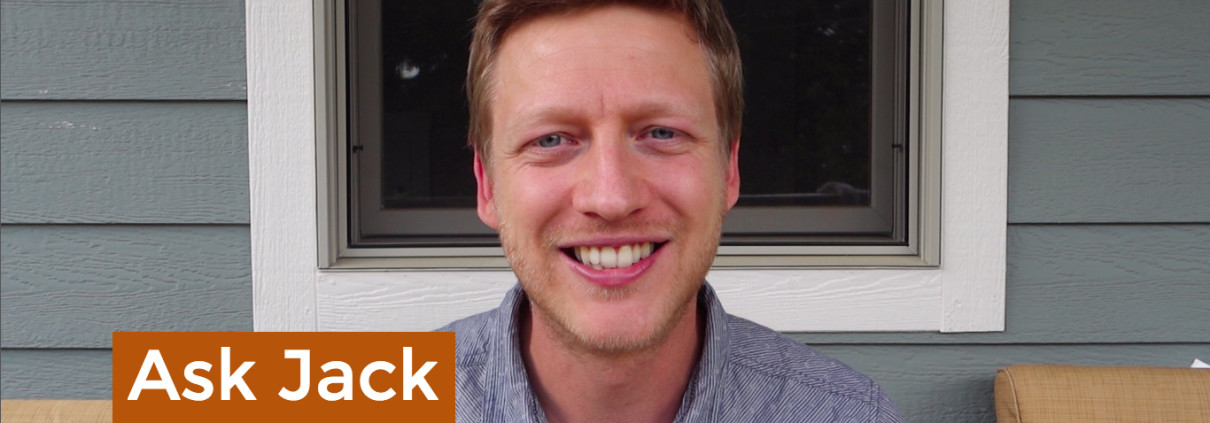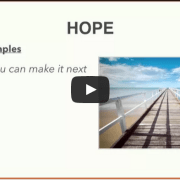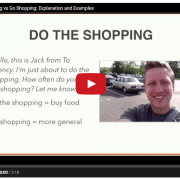Welcome to episode 2 of Ask Jack.
In this episode, I answer questions on school vocabulary, making English part of your daily routine, and using prepositions with the present perfect.
In the last question, I reveal one of the biggest mistakes I see learners make.
Watch in HD!
Share the episode with your friends, and then continue reading below…
Transcript
Hello, everybody! This is Jack from tofluency.com, here with episode 2 of Ask Jack. So thank you, everybody, for your response to the first episode.
If you haven’t seen that already, you can click the link to watch it now but if you have, then here is episode two for you. Now, it’s another beautiful day here in Asheville, North Carolina, so I’m going to do this again here on my porch. So
let’s get straight into question 1 in today’s episode.
Stan from Russia asks: do you say I’m in the fifth grade or I’m in year five? Thank you for your question, Stan.
So, there are two main ways that I know of to say this, and it depends on where you’re from. So, for example, if you’re from the UK you say I’m in year 7; I’m in year 10. But if you’re in the US, then you say things like I’m in the seventh grade; I’m in the 10th grade etc. So, a lot of it depends on where you are
So, a lot of it depends on where you are and who you are talking to. Now, this brings up an interesting difference
between British English and American English and, more specifically, the school systems. So, in the UK, we say things like, “I’m in primary school” where in the US it’s, “I’m in elementary school.” Now, we both say “high school” but in the UK this is from ages about 11 to 16, in the US this is from ages 16 to 18. Now, if you’re in college in the UK this means that you’re from 16 to 18, and this is before you go to university. If you say I’m in college in the US
Now, if you’re in college in the UK this means that you’re from 16 to 18, and this is before you go to university. If you say I’m in college in the US, this means university. So there are many little differences here and it’s confusing for me, someone who has been brought up in the UK but now lives in the US. So, it is quite confusing but you get used to it.
Erikson from Brazil asks: how can I make English part my daily routine? Thank you for this great question Erikson. Now to make English part of your daily routine is really going to help you make fast progress, so it’s a really important thing to think about. However, it’s also important to know that if you introduce more English into your life, then you have to give up other things.
For example, if you want to do more work on your pronunciation, then this might mean giving up watching television
or spending time with family or even just sitting on the sofa playing computer games. So, that’s important to know because if there are things that you give up that you don’t want to give up and you’re doing English instead, then it’s going to be difficult to sustain this over the long-term. And that’s what we want to do: we want to build these habits
and make English part of our routine over the long-term.
Now, the other thing to know is that you can do things in English while doing other things as well. A big example
is listening to English while driving to work or listening to English while doing the housework, so (there are) many things that you can do in English while doing other things. And that will help you use more English on a daily basis.
The last thing I want to say is that to make something part of your routine, you need to make it a habit. And to make something a habit, you need to ensure that you can do it over the long-term. So, when you do things in English make it relevant to you make it fun, and make it sustainable. Doing this will help you use your English, and do the things you need to do in English, over the long term, and that will lead to fast progress to fluency.
Victoria from Russia asks: what’s the difference between I have been to and I have been in? Victoria thank you so much for this question and I’m glad you’ve asked it because this is where I see a lot of mistakes being made.
Now, think about these two sentences: “I’ve been to France ten times.” “I’ve been in the US for
five years.” Okay, so there’s a difference between those two sentences and this just shows that we can use the present perfect to express something differently and we can use different prepositions.
Now, the biggest mistake I see is people saying I’ve in England [for] 4 times/5 times/6 times. This is wrong because when we’re talking about how many times we have been to a place we use “to” as a preposition, for example, I can say
“I’ve been to France ten times.”
Now, when we’re talking about an action that is continuous until now that’s when we use the preposition in. So, I can say, “I been in the US for five years or nearly five years now.” So, that’s a really big difference between the way we use this.
Now, my question for you for this episode is this: Which countries have you been to? Which countries have you
been to? Leave your answers below this video. Thanks for watching and see you next time! Oh, one last thing… I need more questions, so click the link and ask me a question. You can ask me a question about learning English, the English language, or anything related to English.
So, do it now! Bye!
Q1: Year five or fifth grade?
There are two main ways to talk about what year/grade you are in at school, for example, you can say: I am in year 5 (UK) or I am in (the) 5th grade (USA).
In addition, there are many differences between the different stages of school in British and American English. For example, in the USA people say elementary school, whereas, in the UK people say primary school.
Q2: How can I make English part of my daily routine?
To make English a part of your daily routine, you need to get into the habit of using English. One thing to note is that if you do more English you will have to give something up. That’s why it’s important to make it fun, relevant to you, and sustainable over the long-term.
Additionally, think about ways that you can do things in English while commuting, walking, doing the housework etc.
Q3: What’s the difference between I have been to and I have been in?
The different between these two sentences: I have been in America for five years and I have been to America is important.
The first one is talking about the period of time I have been here in America. I moved here 5 years ago and I am still here. That is why I say, “I have been here for five years.” Another way to say this is, “I have been living here for five years.”
The second one is saying that I have been to America, but I’m not there now. For example, I have been to France ten times (actually, it’s a lot more than that!).
What to Do Now:
1. Answer the question below: Which countries have you been to?










I’ve never been abroad yet. Maybe one day… )
Thanks for answering, Nafa!
I have been to the US some years ago. It is the unique foreign country where I have already been.
“I went to the US a few years ago.” The present perfect isn’t used with past time expressions.
Thanks.
I have been to France last summer. It was amazing:)
Thank you!
“I went to France last summer.” You can’t use the present perfect with past time expressions.
Actually I never have been in another country.
My question: Which method do you use, or recommend, to make incidental learning becoming recurrent. Explaining better: As we know Spaced Repetition Systems or SRS nowadays are becoming more common, but in my case I am used to listening a given podcast many times in order to improve my level of comprehension and also my pronunciation. What you think about it?
“… been to…”
Here is a post I wrote about this: https://tofluency.com/natural-repetition-narrow-reading/
I have been to Margarita Island four times.
My question: I mix both British English and American English… could that be an obstacle in the future or an advantage?
Thank you. You’re very cool. 🙂
I have been to Margarita Island four times.
Thank you. You’re very cool. 🙂
Thank you for such a kind comment. I’m glad you liked it!
Till now I´m gathering all money I can to make the trip. I´ve never been to another country yet.
I haven’t been to another country but I hope to study abroad.